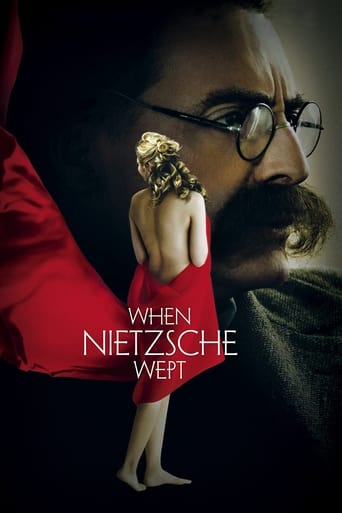johnnyboyz
I just wonder how many people are going to be tuned in to seeking out and sitting through a film all about psychoanalysis, detailing very briefly the more desperate incidences in the lives of some of the most brilliant minds ever to have graced Earth. My heart hopes as many as possible but my mind tells me not many will bother, and given this that's quite a shame. The film is a concentrated study on illness and the effects of illness but the said sickness is more affiliated to love or problems of a psychological kind. The events, no matter how fabricated over history, are still compelling and the film just about works as a drama or a study of an individual's actions given their emotions that run on a dizzying high.The film follows Josef Breuer (Cross) and Friedrich Nietzsche (Assante) who meet and attempt to help one another. The setting is 1870s Vienna in Austria at a time when some of the most brilliant minds ever would congregate to pioneer the study of psychoanalysis; love as an illness and what makes us who we are through these events. On this occasion, Nietzsche has fallen for a woman and she is Lou Salome (Winnick). This acts as the catalyst for him to seek help from Breuer, an experienced and responsible doctor who has battled his own demons in the past to do with one of his parents' early death. Nietzsche at first seeks to run from his problem, thinking escaping to Switzerland will compensate for the pain following the rejection of marriage.But this isn't the end of it. There is no surprise that a film dealing with psychoanalysis, and containing Sigmund Freud, has a few mind games up its sleeve. The film is uncannily seductive in its general atmosphere and quite humbling on other occasions. Breuer is good friends with Sigmund Freud himself (Elman) and they both seem overly concerned with Nietzsche which propels them into at least pretending one of them needs help from Nietzsche in return.In order to achieve this, Breuer assumes the stance that he himself is falling in love with one of his patients and requests the help from Nietzsche in return he help him get over his break up. There's a lot of psychology going on here and a lot of scenes and content that deals with mental health. Nietzsche undergoes perhaps the more interesting study of the characters because his is the more dramatic, slipping into despair and depression after initially trying to combat the break up with 'remedy' from prostitution and, like I mentioned, fleeing entirely.The point When Nietzsche Wept has going for it the whole time is the age of these primary characters. This is not a (another?) mere look at young people in contemporary America or wherever trying to get over relationships or trying to instigate one so that they may have sex, this is a thoughtful and interesting look at people of an older age dealing with real issues that at the time, remained as scary and as ambiguous as you could possibly imagine. The frightening thing that should remain at the back of the viewer's mind is 'what if you were very ill, but you did not know of the illness you have?' Twinned with this, what if you did not know of the treatment and the pain or whatever would simply not disappear? Nowadays, we're all fine with our doctors and so forth and our teen sex comedies that act as an escapist or humoured look at coming of age or love or sex or whatever but When Nietzsche Wept is a pit stop; a look back at times past.The film is a grand display of surrealism, dreams often beginning naturally enough before descending into chaos. We the audience ask the question of what is going on and just when it seems the impossible or the downright obscure is about to happen, our questions are answered. The film is a study into the great minds that pioneered certain theory but it's a look at their own struggles; their own struggles that helped shape an understanding in the first place. The film is a study of a delicate mentality as expressed by those of a brilliant natural intelligence.Whether it's the bizarre manner in which Breuer refers to Freud as 'Siggy' or the odd scenes to do with diegetic classical music complete with orchestra that Nietzsche himself composes to the bemusement of those around him, the film remains an interesting look at a subject that is being dealt with head on rather than in a metaphorical or dramatic way, much like Hitchcock and Lynch have done in the past. But don't be fooled for it isn't a documentary and it does retain a fair amount of drama throughout. It may not be as good a metaphorical study but it remains interesting and thought-provoking.
Robert J. Maxwell
What an ambitious film! Richard Wagner, Josef Breuer (Ben Cross), Friderich Nietzsche (Armand Assante), and Sigmund Freud (Jamie Elman), all of whom knew one another on or around the streets of Vienna in 1872 with, in the case of Wagner, only one degree of separation. Where are OUR giants? I'm trying to figure out why the film didn't work all that well for me. For one things, I'm not familiar with the book it's based on, although I don't know if that's an obstacle to my appreciation or not. Other reviewers who are familiar with the source seem to feel the movie stinks.It's true that it's pretty talky and some of the atmosphere is rarefied. See, the way it works is that Breuer, a mentor to Freud, is having lots of problems of his own and agrees to treat Nietzsche's migraines and "despair" in return for Nietzsche's teaching him how to deal with his loneliness and feelings of emptiness. And though I can more or less keep up with Breuer and his pronouncements, I sometimes got lost with Nietzsche. "Time is our greatest burden," he tells Breuer, "and our greatest challenge is to live in spite of it." And, "Death only loses its terror when one has consummated one's life." Huh? There have been many other attempts to bring great minds set on different courses together. Steve Allen had a TV show in which dinners were shared by the likes of Alexander Hamilton and Carmen Electra, and recently there was "Mindwalk" with Sam Waterston, but compared to this film, those efforts were more like episodes of Sesame Street.Still, it's interesting to witness the birth of modern psychology as it climbs out of the medieval murk and gets a double dose of philosophy and science. No more phrenology or physiognomy. And, according to this story, Breuer gets the notion of the Oedipus complex from Nietzsche and the three intellects together assemble the notion of the unconscious (though it was hanging around for centuries unnoticed by most practitioners). There's even a hint of family counseling and Milton Erikson when Nietzsche points out that Breuer is blaming himself for the illness of Bertha Pappenheim, one of his hysterical patients, when in fact by exhibiting her symptoms in such worrisome profusion, Bertha Pappenheim has got Breuer by the short hairs. As Erikson was to say a hundred years later, there are two ways to get people to carry you around -- one is to be powerful enough to order them to carry you around and the other is to collapse.There's a bit of humor too, especially when Nietzsche prompts Breuer to close his eyes and imagine what would happen if Breuer were having breakfast with his amour and threw a handful of insults at her.Ben Cross is adequate as the tall, deep-voiced, uptight Breuer. Elman is good as the 25-year-old Freud. Armand Assante is great as Nietzsche of the monstrous mustache and spectacles, an exceptional actor. What colorful, shocking, and well-integrated dreams they had in those days. And I mean "dreams" literally. (Not just in the film but as described in Freud's works.) Mine tend to be far less organized, with images and personalities melting into one another, filled with non sequiturs -- and whoever is responsible for the lighting in my dreams ought to be brusquely spanked. Every scene is under lighted and tinted orange. Let's get with the program, shall we? Anyway, I was alternately bored and involved in the sometimes complicated goings on, but was genuinely moved at the end, when Nietzsche does, literally, weep. I don't know why exactly. Maybe just the sight of two men who have been trading barbs along with insights acknowledging that they are dear friends. It's nice to see people get along.
lastliberal
Josef Breuer and Sigmund Freud did work together and they did collaborate on a book about Anna O, who was most likely Bertha. Lou Salome did have relationships with Nietzsche and Freud and many others. All of these things are true.But, Breuer did not treat Nietzsche. That is in the author's (Irvin D. Yalom) imagination, and what a great imagination it was. The story makes a super philosopher seem human, with frailties that we all suffer. It also makes for an interesting story of how psychoanalysis came about. I can imagine that it really did develop this way as Breuer and Feud discovered what worked and what didn't. We see free association or "chimney sweeping" as Bertha called it, we certainly see transference, and much more as the discipline developed.Ben Cross was excellent, Armand Assante gave the best performance I have ever seen from him, Jamie Elman let us see Feud as a young man, Katheryn Winnick certainly makes me want to see her again, and Michal Yannai was delightful.A great period piece that will delight all who care about philosophy and psychology.
william-hartanto
It is not a movie for everyone. I think this movie will only speak to those experiencing Nihilistic feeling that there is no truth, there is no meaning to life, to my life. Some might call it Mid Life Depression, but I think it is more common than some old guys living in fear of life unfulfilled.I think we are all afraid of death. That is why human created false beliefs of "God" - to create meaning, purpose, reason to our lives. The movie started with Nietzche giving a speech that "We created God, and now we have killed Him. God is Dead".Sadly revelation of the truth creates a gap that yearn for meaning, and when we failed to find that meaning, we started to think that nothing is true, nothing has value, nothing has meaning.The movie might be perceived as two old men's obsession with young beautiful women. But I think the women are just their yearning for a distraction in their despair to find that perhaps they have been living a meaningless life.This movie is profound. It is not for everyone. But if you have been wondering whether you have been living the right life that you want - you might be able to associate with the "madness" of despair that this movie portrays





